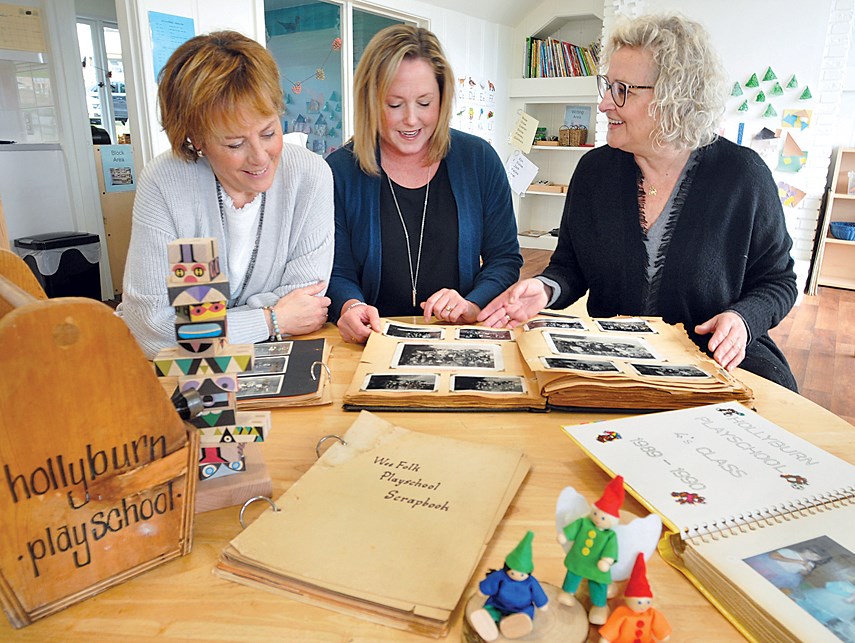The war was over and somewhere in West Vancouver something was going on.
A newspaper article in the Vancouver Sun, dated Jan. 25, 1947, points to a “unique experiment in co-operative pooling of time and talent for the care of preschool children” that was happening at the former United Church, carried out by the mothers of some “18 or 20 children in West Vancouver.”
That experiment, which eventually morphed into what would be called the Wee Folk Play School, saw local moms forming a co-operative in order to take turns looking after each other’s children for a few hours in the morning several times a week.
“On her free days she can go through her housework like a steam engine without interruption,” the article goes on to state.
Times – and hopefully attitudes – have changed, but the need for a dependable preschool has not.
Looking out upon the rolling waves and bustling Seawalk, a group of youngsters at Dundarave Preschool by the Sea can take in the wide open world beyond the confines of their school.
The preschool, located on Bellevue Avenue at its longstanding home in Dundarave Fieldhouse, is celebrating decades of play-based education this year. A recently acquired treasure trove of documents containing photos, roll calls, minutes of parent meetings, and school attendance records shines a light on the preschool’s past – and its connection to that “unique experiment” in childminding and early education.
Caroline Thomson, the director of Dundarave Preschool, describes sifting through the boxes of historical documents as “jaw-dropping.”
“Even the minutes of the meetings are all handwritten,” says Thomson. “The pictures take you right back, it was just amazing. I don’t know how to explain it.”
Dundarave Preschool became what it is today, nestled between the Seawalk’s picturesque views and a playground overlooking it, through the amalgamation of a few other preschool groups.
The preschool, at one time, was called Hollyburn Preschool, or Hollyburn Playschool, or before that, Hollyburn Co-operative Preschool. Originally formed in 1950 under another name, the playschool group moved locations over the years, from local churches to legion halls, until a group of mothers realized the great potential of the fieldhouse in the Dundarave neighbourhood by 1960, and the group began renting the space some years later.
“The building is still relatively the same – the same shutters!” exclaims Thomson.
Rob Inman, who was the past president of Hollyburn Preschool in the early ’90s, was responsible for recently delivering many of the documents that shed more light on the school’s past.
Compiling everything into a cogent history was no easy task but, he says, it was well worth it.
“My son is now 29, he left there 25 years ago,” says Inman. “I’m really big into history and heritage and everything like that. I was interested in how things were done in those days. … What really stands out is the fact that … this is actually a physical structure that still stands on the waterfront in West Vancouver.”
As for Wee Folk Play School, a drop off in enrolment in the late ’60s compelled the group to amalgamate with Hollyburn, according to Inman. Wee Folk first formed in 1946, and the co-operative preschool is part of a through line connecting it to Hollyburn Preschool, which eventually became Dundarave Preschool by the Sea.
A Wee Folk school inventory, dated Sept. 1, 1948, lists a gramophone, cookie tin and tapestry needles among the preschool’s supplies, and a typed out constitution for the group, undated, lists the official school colours as “red, yellow and blue,” with the school being operated by “mothers of children attending.”
Things have changed since then. In 1994, the current preschool moved from a parent participation model to employing certified early childhood education teachers. Today, at Dundarave Preschool by the Sea, that includes Thomson and two other ECE staff members.
Dundarave is a play-based school, notes Thomson, meaning: “We really work with language development, social skills and having the children learn about the world through play.”
Thomson and staff take great pride in their work, with Thomson noting they get to be among “the first educators to be able to mold them in a positive way to get them to be independent doers, independent thinkers.”
And although Dundarave Preschool evolved out of the wake of Wee Folk and Hollyburn Preschool, some things still remain the same, she says. Much like Wee Folk’s early constitution, which dictated the school would only operate for a few hours a couple times a week, Dundarave Preschool continues with that tradition of focused short sessions, allowing youngsters to pack in a lot of play and exploration into a short burst.
“There’s still a need for the shorter hours of preschool,” says Thomson. “Play is work for children. They’re very busy.”
Thomson recalls fondly the preschool’s long-standing West Vancouver legacy, observing the sense of pride that even some of the three and four year olds exude for their school by the sea.
“‘This is my preschool,’” Thomson recalls some kids saying. “‘This is my preschool.’”



